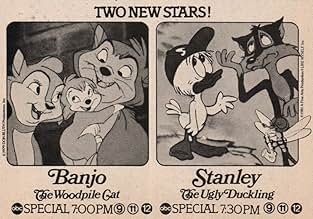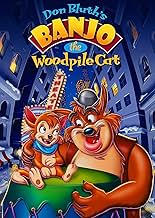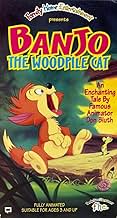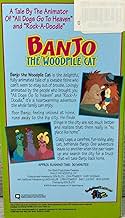IMDb RATING
6.5/10
483
YOUR RATING
A mischievous kitten named Banjo runs away from home and soon realizes he may have made a mistake.A mischievous kitten named Banjo runs away from home and soon realizes he may have made a mistake.A mischievous kitten named Banjo runs away from home and soon realizes he may have made a mistake.
Scatman Crothers
- Crazy Legs
- (voice)
Beah Richards
- Zazu
- (voice)
Sparky Marcus
- Banjo
- (voice)
Ken Sansom
- Additional Voices
- (voice)
Anne Beesley
- Additional Voices
- (voice)
- (as Ann E. Beesley)
Robin Muir
- Additional Voices
- (voice)
Georgette Rampone
- Additional Voices
- (voice)
- (as Georgette Ramponi)
Jackie Ward
- Singer
- (voice)
Sally Stevens
- Singer
- (voice)
- Director
- Writers
- All cast & crew
- Production, box office & more at IMDbPro
Featured reviews
When I was growing up my parents had made me a video with loads of cartoons on taped from the TV. Of all the Bugs Bunny and Road Runner cartoons Banjo has always stuck in my mind. Perhaps the accessibility of the Warner cartoons has deteriorated my fond memories of them, but after 15 years I have found proof that this cartoon existed.
All I remember is a cat called Banjo who does something naughty so his father beats him and he runs off to Salt Lake City to live with some showgirls. When I told that synopsis to my friends they really didn't know what I was talking about.
After a bored afternoon it suddenly dawned on my to try the IMDB, low and behold I found Banjo. I've now ordered the VHS - I hope that it is as good as I remembered.
All I remember is a cat called Banjo who does something naughty so his father beats him and he runs off to Salt Lake City to live with some showgirls. When I told that synopsis to my friends they really didn't know what I was talking about.
After a bored afternoon it suddenly dawned on my to try the IMDB, low and behold I found Banjo. I've now ordered the VHS - I hope that it is as good as I remembered.
Banjo the woodpile cat begins the story with a cat named Banjo who lives with his family, he loves doing stuff that's very dangerous he got scolded by his father until one day he decides to run away from home and ends up in a city all alone until he meets Crazy Legs and they become friends, then we meet Zazu, Cleo and Marina, they sing a song, but then Banjo realizes that he must catch the truck to his house, then we he got into the truck he says goodbye to his friends and arrives at home while his family was worried, everything ends fine and that's how the story ends while the credits roll while he goes to sleep.
"Banjo the Woodpile Cat" is a 1979 animated short directed by Don Bluth. I, like most, got drawn to this because of the importance this has to Don Bluth and animation history. Don Bluth is an absolute animation legend; I am a huge fan of his. Knowing this, you can see the evolution of an artist. There are many Don Bluth tropes introduced in this story that go on to be staples in his future projects.
The movie follows the titular Banjo, a cat who could not behave, who seldom does what he should. He lives in a woodpile in Payson, UT with his Mom, Dad and 2 sisters.
The short teaches simple lessons about being good and being grateful. It is nicely animated, has catchy songs and Banjo is one of the cutest animated cats. The short does its job. I feel bad for the characters when I should, I root for them to succeed and cheer for them when they do.
On the negative side, there are some characters added in around the third act that I don't feel were good additions. With how simple the story is, it could have been trimmed down to 20 minutes. After the story has its low point, I think they spend too much time trying to cheer our main character up.
Not a perfect short, but an important step on the road to animation greatness. It's not that Banjo was second rate; it's just it couldn't be great.
The movie follows the titular Banjo, a cat who could not behave, who seldom does what he should. He lives in a woodpile in Payson, UT with his Mom, Dad and 2 sisters.
The short teaches simple lessons about being good and being grateful. It is nicely animated, has catchy songs and Banjo is one of the cutest animated cats. The short does its job. I feel bad for the characters when I should, I root for them to succeed and cheer for them when they do.
On the negative side, there are some characters added in around the third act that I don't feel were good additions. With how simple the story is, it could have been trimmed down to 20 minutes. After the story has its low point, I think they spend too much time trying to cheer our main character up.
Not a perfect short, but an important step on the road to animation greatness. It's not that Banjo was second rate; it's just it couldn't be great.
More often than not, animators who work in mainstream studios like Disney, Pixar or Dreamworks will make their own personal projects on the side from their day jobs, like Andreas Deja's Mushka or Andrew Coats' Borrowed Time. So back in 1979, the year Don Bluth and his team left Disney for good to pursue their own work, the first project they completed was a short film they had made on the side from the Mouse House called Banjo the Woodpile Cat. The best way to describe this film is a simple albeit noble effort from a group of passionate animators who were only learning the steps of filmmaking as they went along.
The story focuses on a rebellious kitten named Banjo, who after getting into trouble, decides to run away from his woodpile home in his owners' farm in Payson, Utah by catching a truck to Salt Lake City. Admittedly, the story is very straight forward, and while it does have a few dangerous obstacles and Banjo's encounter with a charming hipster cat named Crazy Legs, there aren't many surprises and the overall goal makes the film rather predictable as a result. It doesn't help that the film doesn't take time to let Banjo develop as a troublesome rascal who learned responsibility properly and the ending has little to offer in return. That being said, one can forgive Bluth and his crew as narrative was only something they were just starting to grasp on, and at least the film offers some entertainment value to keep the momentum going, like Banjo's city antics and his growing friendship wth Crazy Legs. One call tell how eager Crazy is to help out poor Banjo through kindness in spite of his poor lifestyle, and their time together truly feels like a growing relationship of felines who stick together through thick and thin.
Now in terms of technicalities, this film was actually made in Don Bluth's garage, yet the visuals look as remarkable as anything Disney would have made then. In addition to the usual fluid and overly expressive character animation common in Bluth's films, noteworthy techniques like backlit shadows, snow and rain, and effective lighting are used to their full potential. The backgrounds are also a nice touch, as they help display rich atmosphere with their color palettes and details, such as the mundane Utah farmland and the lively albeit gloomy presence of Salt Lake City. It's always admirable to see animators embrace their craft in their own free time, because it can lead to more fascinating results than what they would have made at major studios. Lastly, the few musical numbers that appear either narrate Banjo's presence or provide wholesome fun, although one could argue they could have been removed to save on time. Plus, it's a better idea to have a narrator only detail a character's arc, not describe a scenario that's already happening so the audience can fill in the blanks themselves.
So in spite of his shortcomings, Banjo the Woodpile Cat is still an intriguing look into Don Bluth's early filmography. As this was the short film that kickstarted Bluth's career as a somewhat revolutionary animation director, it serves as a charming starter for those who are yet to discover his works. It really goes to show you how much a simple short film made in someone's house can lead to a promising albeit complicated future in any medium, be it filmmaking or computer science. Whoever the next underground genius will be is only an inch away from growing a huge status.
The story focuses on a rebellious kitten named Banjo, who after getting into trouble, decides to run away from his woodpile home in his owners' farm in Payson, Utah by catching a truck to Salt Lake City. Admittedly, the story is very straight forward, and while it does have a few dangerous obstacles and Banjo's encounter with a charming hipster cat named Crazy Legs, there aren't many surprises and the overall goal makes the film rather predictable as a result. It doesn't help that the film doesn't take time to let Banjo develop as a troublesome rascal who learned responsibility properly and the ending has little to offer in return. That being said, one can forgive Bluth and his crew as narrative was only something they were just starting to grasp on, and at least the film offers some entertainment value to keep the momentum going, like Banjo's city antics and his growing friendship wth Crazy Legs. One call tell how eager Crazy is to help out poor Banjo through kindness in spite of his poor lifestyle, and their time together truly feels like a growing relationship of felines who stick together through thick and thin.
Now in terms of technicalities, this film was actually made in Don Bluth's garage, yet the visuals look as remarkable as anything Disney would have made then. In addition to the usual fluid and overly expressive character animation common in Bluth's films, noteworthy techniques like backlit shadows, snow and rain, and effective lighting are used to their full potential. The backgrounds are also a nice touch, as they help display rich atmosphere with their color palettes and details, such as the mundane Utah farmland and the lively albeit gloomy presence of Salt Lake City. It's always admirable to see animators embrace their craft in their own free time, because it can lead to more fascinating results than what they would have made at major studios. Lastly, the few musical numbers that appear either narrate Banjo's presence or provide wholesome fun, although one could argue they could have been removed to save on time. Plus, it's a better idea to have a narrator only detail a character's arc, not describe a scenario that's already happening so the audience can fill in the blanks themselves.
So in spite of his shortcomings, Banjo the Woodpile Cat is still an intriguing look into Don Bluth's early filmography. As this was the short film that kickstarted Bluth's career as a somewhat revolutionary animation director, it serves as a charming starter for those who are yet to discover his works. It really goes to show you how much a simple short film made in someone's house can lead to a promising albeit complicated future in any medium, be it filmmaking or computer science. Whoever the next underground genius will be is only an inch away from growing a huge status.
Hi! This is Animation Hobbyist Michael Aaron Igafo-Te'o and I Have Graduated from Jackson High School and I Want to do a review on Sullivan Bluth Studios' Debut Film -- It All Started when Don Bluth, Don's colleagues (John Pomeroy and Gary Goldman) along with 17 Animation Artists leaving Walt Disney Animation Studios' old animation lot (on Alameda Drive) in Burbank to finish "Banjo the Woodpile Cat" in The Garage at Don Bluth's former home in Ventura, California after working on this short since 1975 and the film's success kick-started Don Bluth Productions' independent careers working on Box Office Favorites from Don Bluth and his Team, ranging from "The Secret of N.I.M.H." to A Bundle of Animation Tutorial DVDs in 2009 when Don started "Don Bluth Films" in Scottsdale, Arizona as "Banjo the Woodpile Cat" was released on 2-Disc DVD for the first time in Don Bluth's history! I Remember first seeing that short on VHS Tape when I was a little boy in 1998! (After I Was Born in September 9th, 1994!)
Did you know
- Quotes
Crazy Legs: I'll stick with you, kid. You stick with me. Now together we'll overcome adversity. And old man trouble: well, he'll have to let you be, cause you're gonna come out smiling
[singing]
Crazy Legs: If you stick with me.
[Holds up Banjo]
Crazy Legs: So keep your chin up and look up high. You'll find your troubles will pass you by.
- Alternate versionsThe Spanish dub re-edits most of the songs. "The Rain Song" is replaced by one that was originally deleted.
- ConnectionsFeatured in La une est à vous: Episode dated 24 December 1988 (1988)
- SoundtracksHe Couldn't Be Good
Music and Lyrics by Don Bluth
Performed by Jackie Ward, Sally Stevens and Sue Allen
Details
- Release date
- Country of origin
- Language
- Also known as
- Banjo the Woodpile Cat
- Production company
- See more company credits at IMDbPro
- Runtime
- 29m
- Sound mix
Contribute to this page
Suggest an edit or add missing content


























